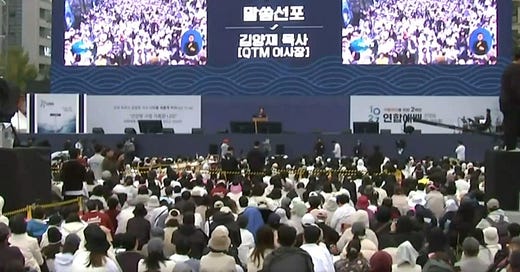Analysis: The push for anti-discrimination legislation in South Korea
Anti-discrimination legislation is becoming a larger issue in South Korea with youth and globally-exposed individuals supportive of reform
Event or Trend: Protests by Christian groups on 27 October 2024, followed a court ruling granting same-sex couples access to state health insurance, highlighting ongoing resistance to anti-discrimination reforms.
Significance: South Korea stands at a pivotal moment as it grapples with progressive demands and conservative opposition. While civil rights movements gain traction globally, South Korea’s lack of comprehensive anti-discrimination legislation may soon clash with shifting demographics and economic imperatives. For policymakers and investors, understanding these dynamics is essential to anticipate changes in the business environment and societal cohesion.
Analysis: The 27 October 2024 protests drew hundreds of thousands of participants with independent estimates at 220,000 and organizer estimates at 1.1 million.
The protests were in response to a court decision granting LGBTQ+ couples health insurance coverage. With previous attempts to pass anti-discrimination laws blocked by conservative politicians and religious groups, the struggle reflects deeper cultural divides.
Anti-discrimination legislation is becoming a larger issue. Younger generations, and older Korean expatriates returning to Korea after living overseas have more inclusive attitudes, and will gradually replace older conservative voters. Additionally, exposure to global human rights norms on mainstream and online media are slowly changing public opinion. This shift, over time, will compel political leaders to enact broader protections despite current opposition.
Recent public opinion surveys show increasing acceptance of LGBTQ+ rights among younger Koreans. While opposition remains strong among older, religious demographics, businesses and investors are shifting toward inclusive practices to remain competitive. Taiwan’s legalization of same-sex marriage offers a regional precedent, demonstrating that societal change, while slow, is possible. South Korea’s ambitions to boost foreign investment and align with global norms will likely bolster these reforms.
The diplomatic community in South Korea has also actively supported efforts to pass anti-discrimination legislation by engaging in public advocacy and dialogue with policymakers. Embassies from countries like the United States, Canada, and members of the European Union have issued joint statements encouraging inclusive laws that align with international human rights standards. Diplomats have also participated in public events and forums, amplifying the voices of civil society groups.
The support of the diplomatic community highlights the importance of equality and non-discrimination for fostering social cohesion and improving South Korea’s global standing. This external pressure complements local advocacy, reinforcing the need for comprehensive protections against discrimination.
Strong opposition remains. Conservative groups hold a significant degree of influence, and will seek to stall reforms by appealing to national identity and traditional values. Instead of sweeping legislative change, South Korea will likely adopt incremental policies, addressing discrimination on a case-by-case basis without formalizing comprehensive protections.
Passing anti-discrimination legislation could strengthen South Korea’s global reputation, attract foreign talent, and foster innovation. Failure to act may lead to social unrest, reduce economic opportunities, and alienate the country from international allies and investors. The current political tension underscores the urgency for strategic legislative action.
Outlook: In the short term (0-12 months), intensified activism and political debates are expected. Over the medium term (1-5 years), generational shifts will press politicians to adopt more progressive policies. In the long term (5-10 years), South Korea may align more closely with global human rights standards, driving economic growth and social inclusivity.



